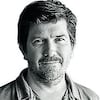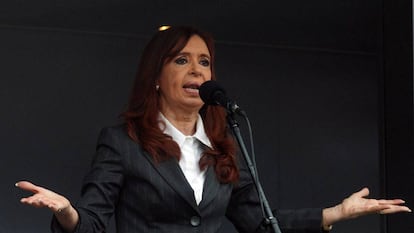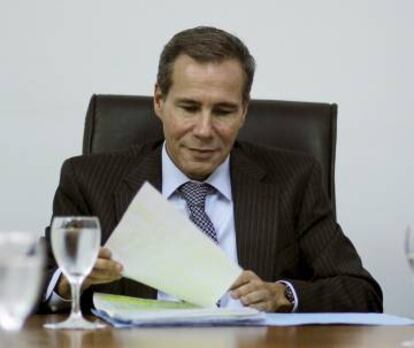Cristina Kirchner faces investigation over alleged cover-up of bombing
Court reopens case brought by Alberto Nisman, whose death two years ago has still not been explained

Two days after a court indicted her for corruption, former Argentinean president Cristina Fernández de Kirchner faces investigation for her alleged role in covering up a 1994 terrorist attack on a Jewish center in the capital of Buenos Aires that killed 85 people.

A federal judge has ordered the reopening of an investigation begun by public prosecutor Alberto Nisman, who accused Kirchner, who was president between 2007 and 2015, of setting up “a sophisticated criminal plan” to protect the identity of the Iranians responsible for the car-bombing of the Israeli-Argentina Mutual Association (AMIA).
On January 14, 2015 Nisman accused Fernández de Kirchner, along with her foreign minister, Héctor Timmerman, and two senior officials of conspiring to cover up Iran’s involvement.
More than two decades on, responsibility for the AMIA attack has not been established
Four days later, the day before he was due to present his findings to Congress, Nisman was found dead in his bath. He had been shot in the head. His case against Fernández de Kirchner was subsequently shelved for “lack of evidence” and the circumstances of his death have never been explained.
In 2013, the government of Fernández de Kirchner signed a deal with Iran allowing five Iranian officials and ex-officials indicted in the AMIA case to give evidence in their own country rather than in an Argentinean court. Nisman alleged that the deal was signed in return for trade agreements and Buenos Aires withdrawing its Interpol arrest warrant.
Now, the Federal Criminal Cassation Court has decided that “the allegations do not permit dismissing out of hand the possible commission of illegalities… evidence should be pondered before being dismissed.” It also removes Judge Daniel Rafecas from the case.
Rafecas last year rejected Nisman’s accusations, saying that the arrest warrant was never withdrawn and that the trade deals never materialized. He concluded that there was no evidence of a cover-up by Fernández de Kirchner.
The day before Nisman was due to present his evidence to Congress he was found dead
But in May 2016, an Argentinean court declared the agreement with Iran null and void, while organizations representing the country’s Jewish community called for Nisman’s evidence against Kirchner to be investigated, a request that has finally been heeded.
“This is like a new beginning. We are back to the day before the death of Nisman, this is a beginning to start the investigation the public prosecutor requested. It doesn’t matter who the accused are, only the charge counts. We will now see what evidence Nisman had in relation to the crime that had been reported,” said Santiago Kaplun, the secretary general of the Delegation of Israeli Associations, to the TN news channel.

Kirchner has always denied a cover up, arguing that the bilateral trade agreement could not be the basis for a criminal case. But Nisman’s lengthy investigation, along with the mysterious circumstances of his death, have led many to suspect Kirchner’s involvement in protecting Iran.
Nisman accused Fernández de Kirchner and her officials of deciding “to negotiate and arrange impunity for the Iranian fugitives in the AMIA case” with the purpose of “freeing the defendants and fabricating Iran’s innocence,” Nisman wrote in a 300-page writ.
We will now see what evidence Nisman had in relation to the crime that had been reported Santiago Kaplun of the Delegation of Jewish Associations
After 20 years, it is still not clear who set off the car bomb on July 18, 1994 at the Jewish center in Buenos Aires’ Once district. It was the worst attack on a diaspora Jewish community since World War II. Subsequent investigations immediately suggested that the government of Iran had been in involved.
In 2006, prosecutors Nisman and Marcelo Martínez Burgos formally accused Iran of planning the attack and Hezbollah of carrying it out. International arrest warrants were issued for suspects in the case, including Iran’s former defense minister Ahmad Vahidi, who at the time was a commander of a special unit of Iran’s Revolutionary Guards.
Other suspects include Ali Fallahijan, former Iranian intelligence minister; Mohsen Rezaee, former government advisor; Mohsen Rabbani, the then-attaché at the Iranian Embassy in Buenos Aires; Ahmad Reza Asghari, a former diplomatic official; and Imad Fayez Mughniyeh, a senior member of Hezbollah who reportedly died in Syria in 2008.
English version by Nick Lyne.
Tu suscripción se está usando en otro dispositivo
¿Quieres añadir otro usuario a tu suscripción?
Si continúas leyendo en este dispositivo, no se podrá leer en el otro.
FlechaTu suscripción se está usando en otro dispositivo y solo puedes acceder a EL PAÍS desde un dispositivo a la vez.
Si quieres compartir tu cuenta, cambia tu suscripción a la modalidad Premium, así podrás añadir otro usuario. Cada uno accederá con su propia cuenta de email, lo que os permitirá personalizar vuestra experiencia en EL PAÍS.
¿Tienes una suscripción de empresa? Accede aquí para contratar más cuentas.
En el caso de no saber quién está usando tu cuenta, te recomendamos cambiar tu contraseña aquí.
Si decides continuar compartiendo tu cuenta, este mensaje se mostrará en tu dispositivo y en el de la otra persona que está usando tu cuenta de forma indefinida, afectando a tu experiencia de lectura. Puedes consultar aquí los términos y condiciones de la suscripción digital.








































